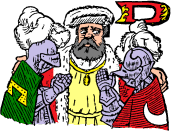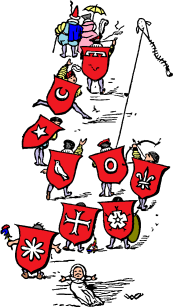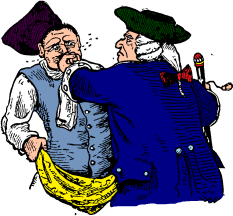HOME
Preface
Introduction
1
2
3
4
5
6
7
8
9
10
11
12
13
14
15
16
17
18
19
20
21
22
23
VIII
CHAPTER VIII
OF DIFFERENCES.
IFFERENCES, or Cadency, signify, in Heraldry, the distinguishing marks on an escutcheon, whereby various members of the same family might, by their shields, be known one from the other. Thus, in ancient times, if a rich uncle had two nephews, to one of whom he had promised something for himself, or a sound thrashing, while to the other, something for his pocket, or a gold noble, and they both appeared before him with their beavers down, it would only be by the differences of their coat armour that he would be able to distinguish them; though, if the to-be-thrashed nephew were wise, the coat he would wear on the occasion would be a cut-away.
Ancient differences consisted of "bordures," which were, as their name denotes, borders placed round the interior of the shield, and were simply used to distinguish the different branches of the same family; or to put it more familiarly, that the various branches of the family might be thus twigged.
Modern differences may be said to go to the root of the tree, and distinguish not only the branches, but even the boughs and leaves, or rather the various sons of the same father.
An eldest son bears a "file," or "label," for his distinguishing badge. Were it the fashion for young gentlemen of the present time to wear their coats of arms as general garments, the "label" would be particularly useful to mothers of families with marriageable daughters, and prevent any nonsensical flirtations with younger and less eligible sons. The "label" also might be still further utilized by inscribing thereon the exact amount of the prospective rentroll, and whether, and how deeply, the property had been dipped. Used thus, the label would indeed be the ticket.
Son number two bears a "crescent." This seems strange at first, and can only be accounted for by supposing that second sons not unfrequently turned out regular Turks in their manners and customs: hence the emblem.
The third son takes as his badge a "mullet," on account, perhaps, of his prospects being, if anything, more fishy than his next elder brother. Not that the cognizance in question had anything to do with the sea, but is, as our readers will observe, a five-pointed star. In fact, it is more than probable that it was called a mullet because that fish was, of all things in the world, what it least resembled.
A fourth son takes a "martlet" for his distinguishing cognizance. This is described by Dr. Johnson (vide that instructive if slightly arid work, his dictionary,) as a "small bird without legs, used in Heraldry."
An "annulet," or small ring, denotes a fifth son; a clear hint that his fortune lies in a ring, or, to reduce it to the roughly modern and material ideas, marrying a girl with money.
For son six a "fleur-de-lys" is provided, though what the supposed connection between them may consist in, we are unable to say.
The seventh young gentleman of the family is distinguished by a "rose." As seven is always supposed to be a lucky number, this must mean that his path in life is destined to be a flowery one.
What in Heraldry is called a "cross-moline," decorates the escutcheon of number eight. If the cross signifies the bias of the temper of the bearer, it argues but badly for domestic comfort.
Last of all comes the "double quatre-foil," for the ninth son. And as the Heralds very properly considered that nine sons were enough for any man, however fond of children, to go on with, they made no provisions for any further additions to the family.
Besides these differences there are also "abatements," and "augmentations." They may be compared to the stripes for good and bad conduct we bestow upon our soldiers. Augmentations signifying the good conduct stripes borne upon the sleeve, and abatements the bad ditto, ditto, which are, as a rule, blazoned gules upon the back of the warrior.
Augmentations are additional charges borne on an escutcheon as marks of honour for services rendered to the sovereign. Thus, Her Majesty the Queen might, if she felt so inclined, and the Prime Minister didn't object, and the Chancellor of the Exchequer didn't think it would cost the country anything, grant to the family house-maid at Buckingham Palace the following augmentation in lieu of raising her wages "argent, a broom sweepant proper," for her services rendered in the domestic department of the palace.
"Abatements" are casual marks attached to coat armour, and denote some dishonourable action of the bearer.
Monarchs in the olden time, like their modern successors, had occasionally bad knights, and when that was the case the Heralds stepped in and did their best to abate them. As a rule, before abating a disreputable warrior, sovereigns not unfrequently cut off his head, and stuck it up on Temple Bar, or some other prominent public edifice, thus placing him at the head of the pole in a way that was certainly not the result of his own election. As a public ornament, these heads were scarcely successes--but after all we ought not to throw stones at our ancestors for their want of taste. Have we not our public statues?
Abatements are of two sorts--"diminution, or reversing." Diminution is the blemishing some particular point of the shield by the tinctures, "sanguine," or "tenne," which we have mentioned in Chapter V., and which are regarded as stains. Reversing is when some cognizance on the shield is turned backward, or upside down. So Sneaker, caught in the act of annexing the pockethandkerchief of Pumpkinson, churchwarden, ratepayer, and porkbutcher,--a big man and strong' in the arms,--would, should Pumpkinson take the law into his own hands, receive an abatement of his joy at the robbery, in the shape of the following heraldic diminution, "on a field (or face) argent, a nose sanguine." Or he might be seized by the irate Pumpkinson, and be turned backward to the police station--which would be reversing S.'s intention, which did certainly not tend to such a goal or gaol.
Now let us have no more differences--though we trust nobody has lost his temper over them, unless, indeed, the temper was a bad one, in which case we hope he has.
VIII
1
2
3
4
5
6
7
8
9
10
11
12
13
14
15
16
17
18
19
20
21
22
23
Preface
Introduction
HOME
Build: 2019/04/20 14:20:08.59+0900(JST)





